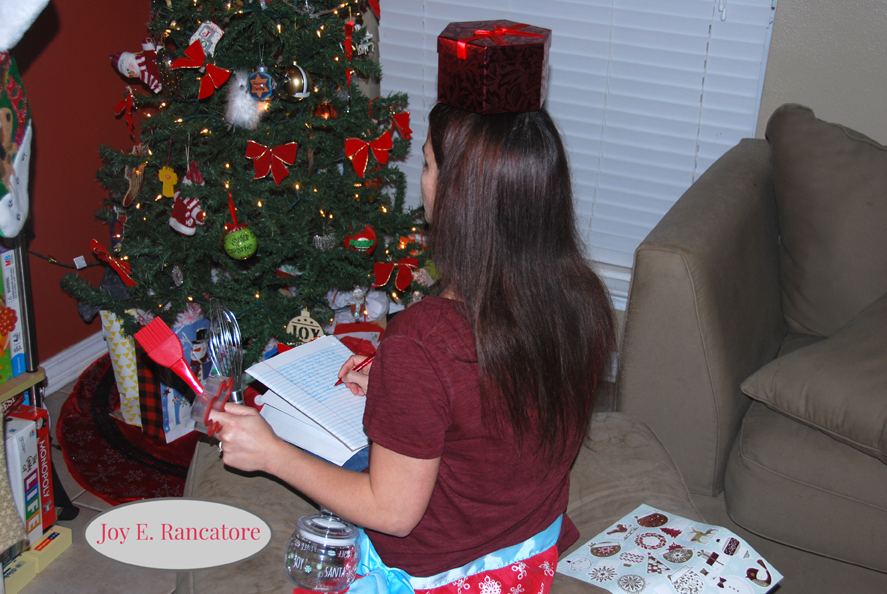or … Why It’s Not Okay to Sit in a Corner and Write during a Party
I do like people. I strive to always be genuine in my interactions, personable in my communication and considerate in my relationships.
Conversely, I would be entirely content to spend most of my days alone with books, paper and pens. While I’m smiling and engaging with the people around me at a party or event, worlds are rising and characters are developing; and, honestly, I would rather be writing.
This doesn’t mean I’m not having fun or don’t appreciate the invitation or don’t genuinely care about the person to whom I’m talking. I simply prefer to write. And, I may or may not have a notebook in my purse in case I can slip away to a solitary corner.
Since I know I’m not alone amongst writers, I thought I’d jot down three ways we can prepare ourselves to write through the holidays. If you don’t write, this post will give you a glimpse into our often preoccupied minds and explain why we may shout out random names or pivotal conflicts our characters must face.
“Everett!”
“Ashurbanipal!”
“Her daughter’s been chosen to be a spy, but she’s kept it from her!”
“His wife’s an evil alien in disguise!” (That one might raise a few eyebrows in your boss’ direction if you blurt it at a company party.)
1. Adapt your schedule in order to write through the holidays.
Holiday work schedules change. Family comes to visit or you have to travel. Children are out of school. Events and parties fill in every night spot on your calendar for a few weeks. You have added responsibilities for shopping, cooking, cleaning, etc., not to mention the black hole that is the Hallmark Channel.
Want to know the primary reason writers struggle to write through the holidays? Schedules and habit go hand in hand. Unfortunately, habits are harder to unwrap than Aunt Sue’s roll-of-tape-a-gift presents and fly away faster than wrapping paper under kids’ fingers on Christmas morning.
You may master productive writing time for weeks or months; so much so you’ve convinced yourself you’ll be as prolific as James Patterson by the new year. And then … November appears. Thanksgiving and too much turkey knock you off track. About the time you see a hint of schedule returning, social demands kick into high gear; and Christmas and New Years throw everything into total chaos.
Winter tends to increase depression. I’ll leave all the reasons and scientific explanations for that to others and give you only that simple statement. I will take it a step further for writers, though. Attempting to break out of two months of poor productivity will only exacerbate this condition. What we perceive as our own personal failures and shortcomings—such as finding ourselves in a “writing slump”—easily keeps us buried deep in the depths of depression.
Though holidays are unpredictable, you probably know most of the big schedule changes and added expectations that await you. Plan for them. Write down a holiday schedule. Even if you’re not a planner-type person (Weirdo!), you need to be one from November through January. Plan ahead as best you can, but remember you’ll still have to be flexible.
2. Communicate with your family.
Unless you have the coolest family on the planet, they’re not mind readers. Set your holiday writing schedule and share it with them. I’m gonna just repeat that last part for myself. Share. It. With. Them. How will they know your goals and plans unless you tell them?
Clear expectations now save from erupting emotions later.
If you’re visiting family, take this opportunity to show them that “this writing thing” is actually work. Explain that you don’t really have “days off.” Take a deep breath, dig deep for that extra reserve of courage and share your writing with them. You may take away more than homemade sweaters and re-gifts from under the tree. They may present you with understanding and appreciation for what you do for the very first time.
3. Determine if why you’re not writing is a reason or an excuse.
I don’t know about you, but I could use my family as the main excuse for why I’m not writing. The thing is, sometimes they need to take a writing spot from me; and that’s infinitely more important. But, most times, I’m simply using them as an excuse shield.
Either I haven’t planned appropriately for our current schedule or I haven’t communicated to them my writing needs. Or, quite likely, I’m using them to cover my fear, laziness or doubt.
I would say to you—and to me; remember I started writing this to myself—two simple words: STOP IT! Seriously!
Don’t use your family or anyone or anything else in your life as an excuse for your not writing.
Do you love to write? Is it your driving passion? Have you tried not to write and found yourself drawn back time and again? Then, you are a writer. You have to write. What you have to do now is make sure you believe this truth and believe that you have a story or message to share with the world.
Once you’ve done that for the first time or reminded yourself of it for the millionth time, make yourself a plan and a schedule. Communicate that to your family and loved ones. Carefully weigh anything that threatens your scheduled writing time and name it what it is—reason or excuse.
Do you have any tricks up your sleeve to write through the holidays? What is the hardest part for you? If you have a writer in your life, what are some ways you’ve helped them with their schedules and goals?


